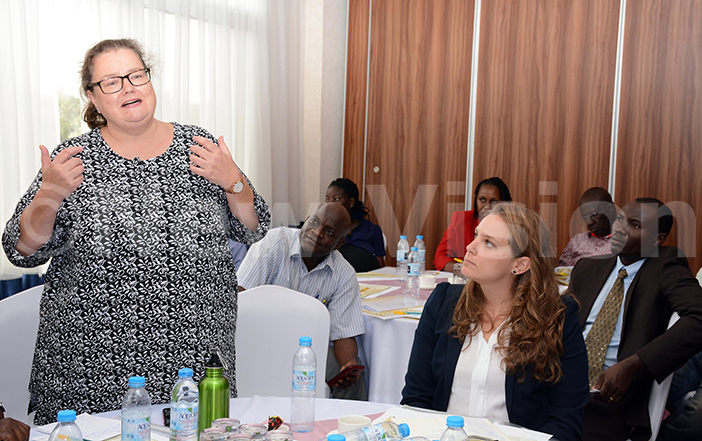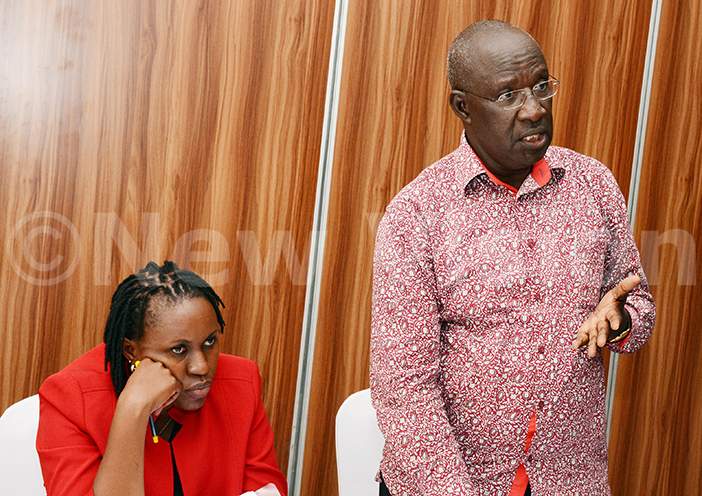Seed dealers call for improved inspection of seed
“Hybrid seeds have a shelf life of two years after which they need to be tested again before they are sold,” he said.
Photos by Eddie Ssejjoba
Agro seed dealers have appealed to government to train and employ more cereal inspectors to ensure all commodities are inspected and certified before they are sold or distributed to farmers.
According to the dealers, strong inspection mechanisms would ensure farmers' access to affordable quality seed and planting materials that guarantee high yields and minimize farm losses.
Reacting to the African Seed Access Index 2017 report at Golden Tulip Hotel in Kampala, members of the Uganda Seed Trade Association (USTA) demanded that government trains more inspectors to strengthen supervision.
They said it would reduce on the large volumes of fake seeds on the market and ensure traders adhere to standards.
Patrick Banage, executive director Seed Company Limited pointed out Container Village, a center in downtown Kampala known for selling agricultural inputs where dealers have continued to sell hybrid seeds after the recommended expiry period of two years, which he said affects farm yields.
"Hybrid seeds have a shelf life of two years after which they need to be tested again before they are sold," he said.
He said inspectors should be able to reach out to all seed distributors and sellers and withdraw from the shelves seeds that have lost quality.
"But there are only seven seed inspectors in the country, how are they expected to physically verify 17 tons of seeds on the market," he said.

Emma Joynson Hicks, the managing director of Ag-Verify Seeds said that most of the local seed varieties were of poor quality, which she said give low yields.
She explained that this had forced many farmers to resort to buying imported seed. She added that some dealers mix imported high quality varieties with counterfeits.
She explained that as a result, farmers register huge losses on the farm, which she attributed to lack of strong supervision systems to prevent such counterfeits from flooding the market.
She attributed the fall in maize prices to poor quality yields, which she said face stiff competition from high quality maize from bigger producers.
She advocated for a wider consultation in regard to improving the quality of locally produced seeds and strengthen supervision to eliminate counterfeit.
Mainza Mugoya, the regional coordinator of The African Seed Access Index (TASAI) who presented the report said that a survey indicated that large volumes of fake seeds that had not been certified continue to be sold openly on the market.
He attributed this to under capacity of the seed sector, saying that Uganda had the lowest number of inspectors compared to 13 other countries in the region.
"Uganda had seven inspectors but recently added only two, this capacity is too low and cannot enable the sector to keep track of the different seed varieties on the market," he said, adding that Kenya for example had 84 seed inspectors, Tanzania has 60 while Zambia has 80.
"For Uganda to show seriousness on agriculture, it needs to strengthen the seed inspection sector by recruiting more inspectors and facilitate them to reach out to all seed breeders and dealers to ensure quality is maintained," he stated.
Mugoya however said that there had been some improvements in terms of sales, with increased volumes of seeds sold to the farmers through National Agricultural Advisory Services (NAADS) program.
He said more volumes of locally developed seeds continue to be exported to countries like DR Congo, South Sudan, Burundi and others.
He appealed to the ministry of agriculture, animal industry and fisheries to increase on the budget for the seed sector to enable them recruit more inspectors and facilitate them to reach out to all items on the market and closely supervise local seed breeders.
James Bulegeya Komayombi however blamed the private sector for failure to create strong mechanisms to monitor and prevent poor quality seeds from being sold to the farmers and instead wait for government to do everything.
He said government did not have the capacity to monitor all the fake and poor quality seeds on the market, which he said was forcing many farmers out of business.
Grace Musimani, the national publicity secretary of the Uganda National Farmers' Federation said that some farmers prefer to buy imported seed varieties because locally produced seeds were of low quality.

He however explained that low seed prices especially with maize had forced some small holder farmers to resort to cheaper local varieties, which he said give less yields.
"Government should build strong inspection systems and facilitate the inspectors to reach out to seed companies before they put their seeds to the market," he stated.
He said shortage of funds had prevented National Seed Certification Services, which is mandated to recruit seed inspectors.
He also appealed to parliament to make stronger laws to protect small holder farmers from fake seeds
Bonny Ntale, a consultant with the seed sector however said there was need to strengthen the National Seed Board and enhance collective action. He explained that early generation of seed was the weakest link in the seed value chain.
"There is need to report on trends in basic seed production instead of focusing on certified seed," he said.